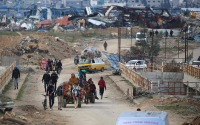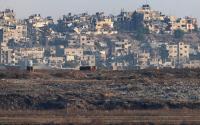11 December 2005Henry Porter
I asked him again about renditions. He revolved his eyes and looked away as though to say I was being dim, which maybe I was. But the problem with rendition, I explained, was that it was such an ambiguous term. A rendition can mean nothing more than a delivery, an exchange, or a return by agreement. Or it can refer to the process of extracting fat from meat by applying heat. Which did he mean? He shook his head. Rendition was delivery and it had nothing to do with fat and meat, and anyway he wanted to talk about something else. And extraordinary rendition? Well, buddy, use your imagination.
Sometime later I learned that rendition referred to the outsourcing of the interrogation of untried terrorist suspects, and that 'extraordinary renditions' could either refer to the capture and transport of suspects in the utmost secrecy, or to the performance of the suspect under extreme conditions - that is to say the information produced by torture. It wasn't clear which, but I suspected it covered both.
As far as I was aware the phrase had not appeared in the media. But there was nothing hard for me to go on. I had no dates, places or names of individuals, and it seemed unlikely that I would get enough to write a piece of journalism. So I started drafting a novel called Empire State and that made things a lot easier because once you go from factual reporting to fiction people tend to talk more.
It was then that I heard a story about five Egyptian al-Qaeda suspects being arrested in Albania and flown to Egypt. The important part was that this had happened before 11 September 2001 - during the Clinton administration - proof that rendition was an established CIA practice.
So I flew to Tirana, stayed in the Rogner Hotel and waited for various contacts I had been given to return my calls. If you hang about in the Rogner sooner or later you meet everyone you need and with a help of a fixer - one of the few Albanian males I met who was not suffering some mild psychotic disorder - I got to the bottom of the story of how five men were trapped by the electronic surveillance of the local intelligence service and were transported to Cairo by the CIA. They were all tortured and two were hanged.
Since it had all happened in 1998 people didn't mind talking about it. Only when I asked about current operations against al-Qaeda in the Balkans did the shutters come down. I left Tirana for Cairo and after many false trails found the facilities where these things were likely to have happened. I also learned that American intelligence officers were part of the process. They did not simply leave the rendered suspects, but remained on hand to receive information produced by the interrogation. That America was collaborating with torturers was shocking, but it was seeing these facilities that brought home to me the terror and despair of the men who were wrung dry before being executed.
Rendition is profoundly wrong and it happens to be against American law. In 1998 the US Congress passed legislation that confirmed the policy of the United States 'not to expel, extradite, or otherwise effect the involuntary return of any person to a country in which there are substantial grounds for believing the person would be in danger of being subjected to torture, regardless of whether the person is physically present in the United States'.
Outsourcing torture is also against International law, but still the secret flights continue across the world and through European airspace - 400 over the United Kingdom alone. Countless suspects have disappeared into various facilities never to be heard of again.
We get hot under the collar about the CIA's 'black sites' in Europe but nothing is done. Last Thursday the Law Lords ruled that the secret tribunals hearing cases related to terrorism suspects could not consider evidence that wouldn't be acceptable in a criminal trial - in other words that which is produced by torture. This is an important ruling for Liberty and the other human rights organisations that fought the case, but it will have no effect on renditions, for as I learned during my trips in 2002, they occur in an entirely different dimension to the criminal justice system of civilised countries. Renditions service the 'intelligence community', not the law courts. They are about gaining information, not proof.
Last week on a trip to Europe, the US Secretary of State, Condoleezza Rice, clarified her country's policy by saying that America would meet its treaty obligations in respect of torture. Two points need to be remembered from her statement. The first is that it was flagged by her aides as an important shift in policy, from which we may therefore conclude that the CIA had been directly involved in the mistreatment of suspects. The second is that at no stage did Rice deny or condemn the practice of outsourcing torture to countries such as Egypt.
Read her assurances carefully and you realise that she did not address the main issue about rendition. As though to underline this, senior al-Qaeda suspects being questioned in Europe were transferred to North Africa prior to her landing in Europe last week.
Are we Europeans content as long as the torture is not going on in our backyard? It would seem so, but in Britain we should remember that during the war, when we faced a greater threat than the one posed by al-Qaeda, we did not resort to torture. The late Colonel T. A. Robertson, a friend of my family's, was known as TAR in MI5, where for much of the Second World War he directed the B1(a) section responsible for tracking down Abwehr agents. He would no more have contemplated torture than amputating his own right hand. No doubt this charming man was as hard as nails but he was also civilised and, like the rest of his generation, fought for civilisation.
We affirm and protect civilisation by behaving within its constraints, not by shipping blindfolded men into dungeons where they are plugged into the electricity supply. If only the Prime Minister had thought for a few moments before rising in the House of Commons last week to support renditions, he might have recalled that on that very day the court listening to the trial of Saddam Hussein heard evidence from women who claimed to have been tortured by the dictator's secret police.
What is the moral difference between Saddam's behaviour and the American renditions? There is none. For the dirty secret about torture is that it is not simply to gain unreliable information but that it is a weapon of punishment and extreme terror, which is deployed in exactly the same way by America as it was by Saddam. Knowing that, imagine yourself a Muslim and then see what you think about extraordinary renditions.






